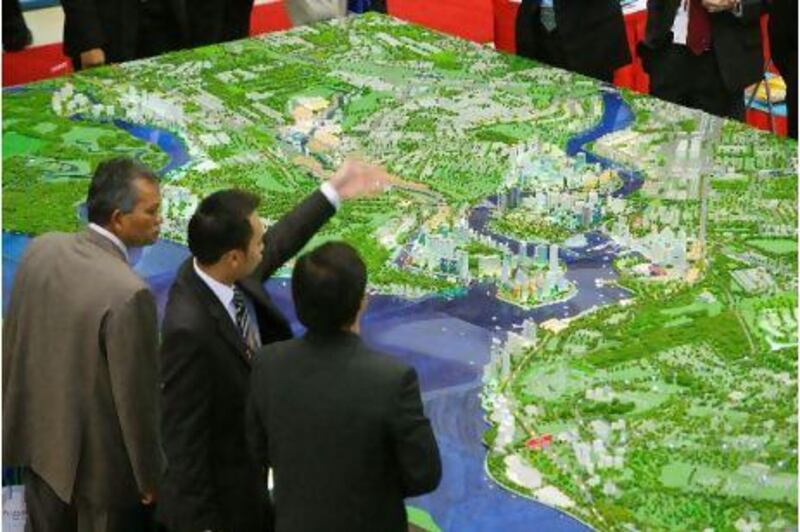The GCC and Malaysia signed an agreement yesterday aimed at encouraging trade between the region and one of Asia's fastest-growing economies.
The so-called framework agreement sets the stage for a full-on free trade agreement that Malaysia hopes to finalise with the GCC within the next two years. Free trade agreements typically eliminate tariffs and other taxes and fees imposed on imports and exports.
"This relationship [with the GCC] has evolved over the years, which has allowed both parties to explore and leverage on areas of huge potential in trade and investment, and I hope this will be a major turning point in lifting our economic ties to much greater heights," Najib Tun Razak, the Malaysian prime minister, said at an investment forum in Abu Dhabi yesterday.
Trade between the UAE and Malaysia was worth about US$5.6 billion (Dh20.56bn) in 2009, Sultan al Mansouri, the UAE's Minister of Economy, said at the forum. By breaking down trade barriers and strengthening economic co-operation, he said he believed that figure could increase "by four to five times in the next three to four years".
"No doubt, this step [the framework agreement] will take a strategic role in enhancing economic and strategic co-operation between our countries," he said.
Negotiations on the free trade agreement are expected to begin in March.
Some Gulf-based businesses already have investments in or trade ties with Malaysia. One of the biggest is Mubadala Development, a strategic investment company owned by the Abu Dhabi Government. A consortium of investors that includes Mubadala had put $720 million in part of Iskandar Malaysia, a development region promoted by the Malaysian government as a destination for foreign investment. Mubadala also signed on to a partnership in October to develop an aluminium project in Malaysia and work with the state-owned 1Malaysia Development Berhad in Kuala Lumpur's new financial district.
Mubadala Aerospace, a unit of Mubadala, is also targeting opportunities in Malaysia and other Asia-Pacific countries this year as part of plans to broaden its global footprint.
It will explore opportunities with Malaysia's National Aerospace and Defence Industries covering training, aircraft manufacturing, design and assembly, in addition to commercial and military aircraft maintenance, Mubadala Aerospace said yesterday.
The focus on Asia comes as the airline industry is expected to see rapid growth in the region, fuelled by the rise of China as a global economic power. Malaysia's economy grew by 6.7 per cent last year and is expected to expand by an additional 5.3 per cent this year, according to IMF estimates. Malaysia is targeting annual growth of 6 per cent to reach its long-term goal of pushing per-capita income to above $12,000. The average Malaysian's income is now about $8,000 a year.
"For us to be a global player we have to reach out to all the key markets in the aerospace field, and South East Asia is one of those leading growth markets," said Homaid al Shemmari, the executive director of Mubadala Aerospace.
Mubadala Aerospace's businesses include Abu Dhabi Aircraft Technologies and the Europe-based SR Technics, two maintenance and repair providers, and Sanad Aero Solutions, which leases and finances engines and aircraft components. Another affiliate, Strata Manufacturing, makes aircraft parts using composite materials in Al Ain.
igale@thenational.ae





